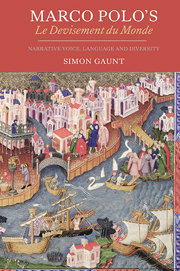Book contents
- Frontmatter
- Contents
- Illustrations
- Acknowledgements
- Abbreviations and a note on citations and editions
- Introduction: Le Devisement du Monde: textual tradition and genre
- 1 Narrative voice and style: ‘ego Marcus Paulo’
- 2 Language and translation: ‘in lingua Galica dicitur’
- 3 Knowledge, marvels and other religions: ‘oculis propriis videt’
- 4 Diversity and alterity: ‘diversarum regionum mundanas diversitates’
- Conclusion: et ipse non notavit nisi pauca aliqua, que adhuc in mente retinebat
- Bibliography
- Index
- Already Published
4 - Diversity and alterity: ‘diversarum regionum mundanas diversitates’
Published online by Cambridge University Press: 05 September 2013
- Frontmatter
- Contents
- Illustrations
- Acknowledgements
- Abbreviations and a note on citations and editions
- Introduction: Le Devisement du Monde: textual tradition and genre
- 1 Narrative voice and style: ‘ego Marcus Paulo’
- 2 Language and translation: ‘in lingua Galica dicitur’
- 3 Knowledge, marvels and other religions: ‘oculis propriis videt’
- 4 Diversity and alterity: ‘diversarum regionum mundanas diversitates’
- Conclusion: et ipse non notavit nisi pauca aliqua, que adhuc in mente retinebat
- Bibliography
- Index
- Already Published
Summary
In the thirteenth and fourteenth centuries Christian Europe confronted two related problems concerning its relation to the rest of the world. First, how was Christendom to turn back the apparently relentless and frequently bellicose expansion of Islam, in particular its reconquest of the Holy Land, to which many believed Christianity had inalienable historic rights? secondly, was the vast, and in medieval terms global, empire of the Mongols that had made its presence felt sharply from the 1240s onwards, friend or foe, a potential ally against Islam or another, potentially devastating, threat? From the brutal Mongol invasions of Russia, Poland and Hungary in the early 1240s through the fall of Acre in 1291, Europe felt beleaguered. While the onslaught of plague from 1347 focused attention on problems closer to home (and also weakened Europe's ostensible enemies), it failed to lessen anxiety about European Christendom being overwhelmed. One reaction to this fear was a sharp sense of the alterity of the rest of the world and, perhaps almost inevitably, xenophobia.
There are certainly texts that inscribe virulent xenophobia – and in particular Islamophobia – while also exploring the possibility that the Mongols might become allies against Islam. A case in point, as we saw in the last chapter, is Hayton's Flor des estoires (1307), which ends with a stirring appeal to the Pope to mount a new crusade against Muslims so that ‘la Terre Sainte, que fu arosée du precieus sanc Nostre Seignor Jhesu Crist, soit delivrée du poer des ennemis mescreans’ (‘the Holy Land, which was watered with the precious blood of our Lord Jesus Christ, may be delivered from the power of our miscreant enemies’).
- Type
- Chapter
- Information
- Marco Polo's Le Devisement du MondeNarrative Voice, Language and Diversity, pp. 145 - 172Publisher: Boydell & BrewerPrint publication year: 2013



